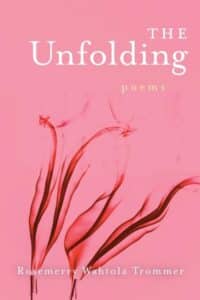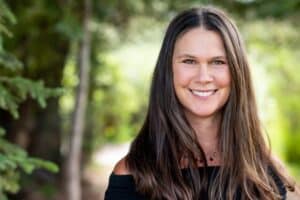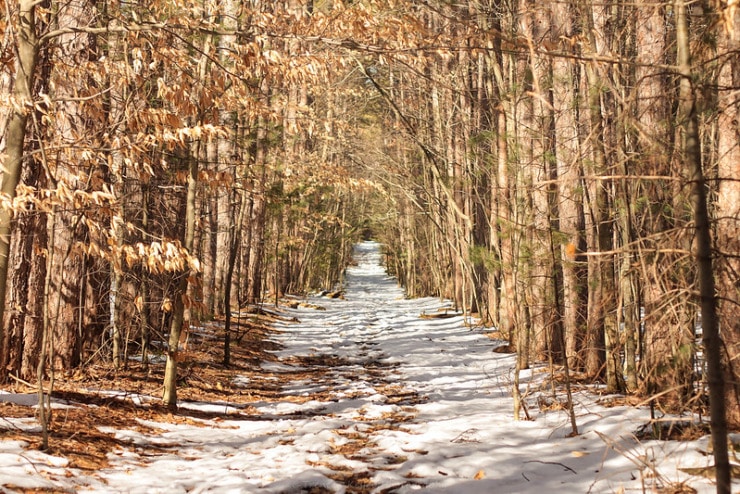Rosemerry Wahtola Trommer uses poetry to explore grief and find hope.
More than 20 years ago, my oldest son had two best friends who were brothers. My son fit right between them chronologically; they’d met at church, participated in the youth group, went on mission trips, and generally hung out at all other times. The brothers were at our house as much as they at their own, and we loved having them around. All three went to different colleges, but they saw each other at breaks, talked all the time on email and the phone, and generally stayed very close.
And then, one weekend, the news came. The oldest boy had killed himself.
You don’t get over news like that. Especially if you’re the family, but also if you’re the close friend, or even the family of the close friend. I still see them coming in the front door, with snacks and a couple of boxes of Kraft macaroni and cheese (which the youngest boy seemed addicted to). I hear their laughter, the joking, and the affectionate insults. I see their smiles; the oldest boy always had a friendly grin on his face, while his brother was something of a prankster.
Time had dulled those memories. Then I read The Unfolding, a collection of poems about the grief following suicide and another death. And the hope that eventually grew.
In August of 2021, Rosemerry Wahtola Trommer was in Georgia with her husband, daughter, and son, helping her parents move into a retirement home. Two nights later, her 19-year-old son committed suicide. Later that year, her father died of kidney failure. Two close family deaths, close together. One inexplicable. One understandable, but still a loss.
Trommer’s The Unfolding isn’t about the stages of grief. I don’t think that kind of loss can have stages, which imply gradually getting over it, coming to terms, and acceptance. Suicide doesn’t work like that.
What she went looking for was how to describe how the shock, the pain, the grief, the memories, and the death will always be there. And how hope is born in the midst of that, and how that how eventually leads her to praise. What she discovered was that the English Language is limited for synonyms of praise, the kind she was experiencing and trying to describe. And so she invented four of her own words and gave them definitions: verilujah, sorrom, samunion, and pangloria. They become the headings of the four sections of the collection’s almost 90 poems.
This is a poem from the “Sorrom” section. She defines the word as “a paradoxical praise for beauty, love, strength and connections that can only emerge as we wrestle with devastation, grief and the worries and pains of daily living; a positive side-effect of surrender and trust in life and death.”
All at Once

were eating breakfast—
a beautiful brown-crusted boule,
warm from the oven,
and he was slicing it and making
a giant mess of it,
the bread tearing and smushing,
and we were laughing—
his head was thrown back
with the joy of making a mess,
carefree and goofy and foolish.
Crumbs everywhere.
God, how I loved him
as he smashed a hardboiled egg
onto the uneven slice.
How I loved him
as he stuffed his mouth
with the botched bread and egg.
How I loved him as we laughed
and laughed and laughed.
How I loved him when I woke
and he was dead,
his absence making the love
no less beautiful, no less true,
our laughter no less mirthful
in the empty room.
That one floored me. Most of the poems in The Unfolding floored me, in fact, requiring deep breaths to steady myself. They bring back what happened, but they also point a way forward.

Rosemerry Wahtola Trommer
Trommer has published several poetry collections, including Celebration: The Christmas Candle Book, Insatiable, Holding Three Things at Once, The Miracle Already Happening, The Less I Hold, Naked for Tea, Hush, and All the Honey. She’s also published Even Now: Poems and Drawings, Interior Landscape: The Four Corners Region in Poetry and Photography, and If You Listen: Poems & Photographs of the San Juan Mountains. She publishes a poem a day at her blog, A Hundred Falling Veils. She has a podcast on poetry and conducts poetry workshops. Her poems have won a number of prizes, included in anthologies, and been published in O Magazine, A Prairie Home Companion, PBS News Hour, American Life in Poetry, and many others. She lives in Colorado with her family.
The poems of The Unfolding were born in the depths of unfathomable pain, with constant reminders of the person who was but is physically no longer. And yet, the person is still part of your heart and always will be. And for that, you’re grateful.
These are poems to cherish.
Photo by Trenten Kelley, Creative Commons, via Flickr. Post by Glynn Young.
How to Read a Poem uses images like the mouse, the hive, the switch (from the Billy Collins poem)—to guide readers into new ways of understanding poems. Anthology included.
“I require all our incoming poetry students—in the MFA I direct—to buy and read this book.”
—Jeanetta Calhoun Mish
- Poets and Poems: Sandra Marchetti and “Diorama” - April 24, 2025
- Poets and Poems: Christina Cook and “Roaming the Labyrinth” - April 22, 2025
- Longfellow’s “Paul Revere’s Ride”: Creating a National Legend - April 17, 2025


Bethany R. says
I’m so sorry for those of you grieving ongoing losses. My heart goes out to you. Thank you for sharing this, Glynn.
My eyes are full of tears here as I’ve finished reading the poem. Such a beautiful, natural pouring out of this dream scene— and then the awakening.
I think this is the third poem in the last three weeks I’ve read of hers and loved.
Glynn says
It’s a fine collection, Bethany.